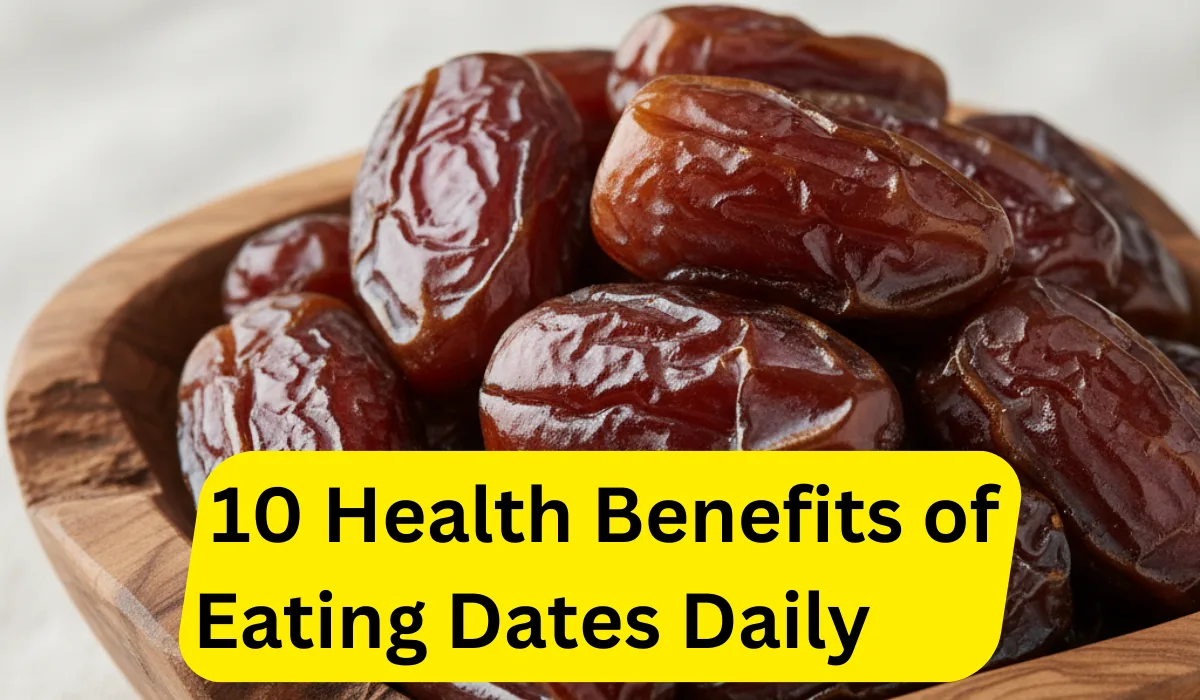Eating Dates Daily
Dates, the sweet and nutritious fruit of the date palm tree, have been a dietary staple for centuries. Originating primarily in regions like Saudi Arabia, Iran, Iraq, the United Arab Emirates, and North African countries such as Egypt, Algeria, and Tunisia, dates thrive in dry, warm climates.
Today, they are cultivated in parts of Southern Europe, Asia, Africa, and Australia. Available in varieties like Ajwa, Medjool, Safawi, Mabroom, Sukkari, Khadrawy, and Deglet Noor, dates are celebrated for their natural sweetness and impressive health benefits. This article explores why eating dates daily can transform your health, backed by their rich nutritional profile.
Nutritional Value of Dates
Dates are a powerhouse of essential nutrients. They contain natural sugars (glucose, fructose, and sucrose), dietary fiber, vitamins (B-complex, C, and K), and minerals like potassium, magnesium, calcium, phosphorus, and iron.
These nutrients make dates an excellent choice for a quick energy boost and overall wellness. Incorporating them into your diet can provide sustained health benefits, making them more than just a fasting food.
Top 10 Health Benefits of Eating Dates Daily
1. Boosts Energy Levels Naturally
Dates are rich in natural sugars, including glucose, fructose, and sucrose, which provide an instant energy boost. Unlike processed sugars, these natural sugars are released slowly, ensuring sustained energy without sudden spikes. Consuming 2–3 dates as a mid-day snack can help combat fatigue and keep you active.
2. Improves Digestive Health
The high dietary fiber content in dates promotes healthy digestion. A single date contains approximately 1.6 grams of fiber, aiding in regular bowel movements and preventing constipation. Fiber also supports a healthy gut microbiome, reducing the risk of digestive disorders.
3. Enhances Blood Health and Fights Anemia
Dates are an excellent source of iron, with about 0.9 mg per 100 grams. Regular consumption can help increase hemoglobin levels, making them particularly beneficial for individuals with anemia. Including dates in your diet supports red blood cell production and improves oxygen circulation.
4. Strengthens Bones and Teeth
Rich in calcium, magnesium, and phosphorus, dates contribute to strong bones and teeth. These minerals are essential for maintaining bone density and preventing conditions like osteoporosis. A daily serving of dates can support skeletal health, especially as you age.
5. Supports Heart Health
Dates contain potassium, which helps regulate blood pressure and supports cardiovascular health. Studies suggest that potassium-rich diets can reduce the risk of heart disease by maintaining healthy blood vessels. The antioxidants in dates also protect the heart by reducing oxidative stress.
6. Enhances Brain Function
The antioxidants in dates, including flavonoids, help protect brain cells from damage. Regular consumption may improve cognitive function and reduce the risk of neurodegenerative diseases. Dates also contain vitamin B6, which supports brain health by aiding neurotransmitter production.
7. Benefits Pregnant and Nursing Women
Dates are highly recommended for pregnant and breastfeeding women due to their nutrient density. They provide essential vitamins and minerals that support maternal health and fetal development. Additionally, dates may ease labor by promoting cervical dilation, as noted in a 2017 study published in the Journal of Obstetrics and Gynecology .
8. Promotes Healthy Skin and Hair
Dates are rich in vitamins C and D, which enhance skin elasticity and hair strength. The antioxidants in dates combat free radicals, reducing signs of aging like wrinkles. Regular consumption can lead to healthier, more radiant skin and stronger hair.
9. Helps Regulate Blood Sugar Levels
Despite their sweetness, dates have a low glycemic index, meaning they cause a gradual rise in blood sugar. This makes them a suitable snack for managing blood sugar levels, especially when consumed in moderation. Eating dates during fasting can help stabilize glucose levels without causing sudden spikes.
10. Maintains Hydration and Electrolyte Balance
Dates are a good source of potassium, which helps maintain the body’s water and electrolyte balance. This is particularly beneficial during hot weather or after physical activity, as it prevents dehydration and supports muscle function.
How to Incorporate Dates into Your Diet
Incorporating dates into your daily diet is simple and versatile. Here are some practical ways to enjoy them:
-
As a Snack : Eat 2–4 dates as a quick energy boost between meals.
-
In Smoothies : Blend dates with fruits and yogurt for a nutritious smoothie.
-
In Baking : Use dates as a natural sweetener in cakes, cookies, or energy bars.
-
With Milk : Soak dates in warm milk for a nutrient-packed drink.
-
In Salads : Chop dates and add them to salads for a sweet contrast.
Choosing and Storing Dates
When selecting dates, opt for plump, glossy fruits with smooth skin. Varieties like Medjool are softer and sweeter, while Deglet Noor is slightly firmer. Store dates in an airtight container in a cool, dry place for up to 6 months or refrigerate them for up to a year to maintain freshness.
Precautions When Eating Dates
While dates are highly beneficial, moderation is key due to their high sugar content. Overconsumption may lead to weight gain or digestive discomfort. Individuals with diabetes should consult a healthcare professional before adding dates to their diet. Aim for 4–6 dates daily to balance benefits and calorie intake.
Conclusion
Dates are more than just a sweet treat; they are a nutrient-dense superfood with wide-ranging health benefits. From boosting energy and improving digestion to supporting heart and brain health, eating dates daily can enhance your overall well-being.
Their versatility makes them easy to incorporate into various dishes, ensuring you can enjoy their benefits year-round. Start adding dates to your diet today to experience their transformative effects.














